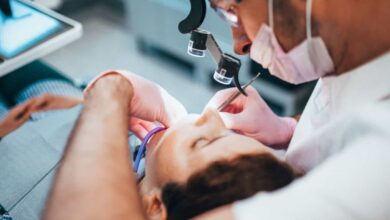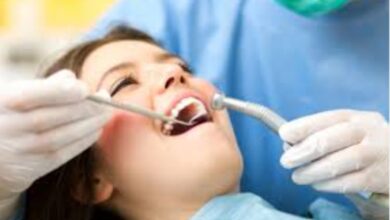Finding the Best Emergency Dentist in Chicago: Your Guide to Immediate Care

- Understanding Dental Emergencies
- Choosing the Right Emergency Dentist
- Emergency Dental Services Offered
- Preparing for Your Emergency Visit
- Aftercare Following Emergency Treatment
- Emergency Dental Care for Families
- Finding 24/7 Emergency Dental Care
- Wrapping It Up: Your Emergency Dental Care in Chicago
Understanding Dental Emergencies
What Constitutes a Dental Emergency?
Okay, so what actually counts as a dental emergency? It’s not always super obvious. Basically, if you’re in a lot of pain, bleeding, or at risk of losing a tooth, that’s an emergency. But there’s more to it than that. It’s about problems that need attention right away to stop things from getting worse. Ignoring a dental emergency can lead to bigger problems down the road, like infections or even bone loss. So, it’s better to be safe than sorry and get it checked out.
Common Types of Dental Emergencies
Let’s run through some common scenarios. You’ve got your classic knocked-out tooth – that’s a definite emergency. Then there are things like:
- Severe toothaches that just won’t quit.
- Broken or cracked teeth, especially if they’re causing pain.
- Abscesses (those nasty infections with pus).
- Lost fillings or crowns that leave your tooth exposed.
- Uncontrolled bleeding after a tooth extraction.
It’s easy to think, “Oh, it’s just a little pain, I’ll wait it out.” But dental problems can escalate quickly. What starts as a minor ache can turn into a serious infection in no time. Don’t underestimate the importance of getting prompt care.
When to Seek Immediate Care
So, how do you know when it’s time to drop everything and head to an emergency dentist? Here’s a simple guide:
- Unbearable Pain: If the pain is so bad you can’t function, seek help.
- Visible Trauma: Obvious injuries like a broken jaw or knocked-out teeth need immediate attention.
- Signs of Infection: Swelling, fever, and pus are red flags.
- Uncontrolled Bleeding: Bleeding that doesn’t stop after applying pressure for a while is an emergency.
If you’re unsure, it’s always best to call an emergency dentist and describe your symptoms. They can help you decide if you need to be seen right away. Don’t hesitate – your oral health is important!
Choosing the Right Emergency Dentist
Finding the right emergency dentist can feel overwhelming, especially when you’re already dealing with pain or anxiety. It’s not something most people think about until they absolutely need it. But doing a little research beforehand can make a huge difference in how smoothly things go. Here’s what I’ve learned about picking the best emergency dentist Chicago for your needs.
Factors to Consider
When you’re looking for an emergency dentist in Chicago, there are a few things you should keep in mind.
- Availability: Can they see you ASAP? Some offices have limited hours or don’t offer weekend appointments, which isn’t ideal in an emergency.
- Services Offered: Do they handle the specific type of emergency you’re experiencing? Not all dentists do everything (like root canals or extractions).
- Technology: Do they use modern equipment? This can impact the speed and accuracy of diagnosis and treatment.
It’s also a good idea to check if they accept your insurance. Dealing with a dental emergency is stressful enough without having to worry about unexpected costs.
Importance of Location
Location, location, location! When you’re in pain, the last thing you want to do is drive across town. Finding an emergency dentist Chicago that’s close to your home or work can save you time and reduce your discomfort. Consider traffic patterns and ease of access when making your choice. A dentist who’s easy to get to, especially during rush hour, is a major plus.
Reading Reviews and Testimonials
Online reviews can be a goldmine of information. They give you a sense of other patients’ experiences with a particular emergency dentist in Chicago. Look for patterns in the reviews. Do people consistently praise the dentist’s bedside manner? Do they complain about long wait times or unexpected fees? Take everything with a grain of salt, but use the reviews to get a general idea of what to expect.
| Review Aspect | Positive | Negative |
| Wait Times | “Seen right away!” | “Waited over an hour.” |
| Dentist’s Demeanor | “Kind and reassuring.” | “Felt rushed and dismissed.” |
| Treatment Outcome | “Pain-free and effective.” | “The problem wasn’t resolved.” |
| Billing Practices | “Transparent and upfront about costs.” | “Unexpected fees and confusing billing.” |
Emergency Dental Services Offered
When you’re facing a dental emergency, knowing what services are available can really ease your mind. Emergency dentists in Chicago are equipped to handle a range of urgent issues, getting you out of pain and back on track.
Tooth Extractions
Sometimes, a tooth is beyond saving due to severe decay, trauma, or infection. In these cases, a tooth extraction might be necessary. Emergency tooth extractions aim to remove the problematic tooth, alleviating pain and preventing further complications. If you’re in Chicago and need a tooth extracted, many emergency dental clinics can help, and they can also discuss options like dental implants in Chicago to replace the missing tooth later on.
Root Canal Treatments
If you have a severely infected tooth, a root canal might be the answer. This procedure involves removing the infected pulp from inside the tooth, cleaning and disinfecting the area, and then sealing it to prevent further infection. Root canals can save teeth that would otherwise need to be extracted. It’s a common procedure, and emergency dentists are skilled at performing them to relieve pain and preserve your natural teeth.
Restorative Procedures
Emergency dentists also provide a variety of restorative procedures to fix damaged or broken teeth. This could include fillings for cavities, crowns for cracked or weakened teeth, or bonding to repair chips and fractures. They might also offer solutions like all on 4 Dental Implants Chicago if you’ve experienced significant tooth loss and need a more comprehensive solution. For those needing wisdom teeth removal in Chicago, some emergency dentists can assess the situation and perform the extraction if necessary or refer you to a specialist.
Preparing for Your Emergency Visit
What to Bring
Okay, so you’ve got a dental emergency, and you’re heading to the dentist. What should you actually bring with you? First off, bring your ID and insurance card. That’s the boring but necessary stuff. If you’re taking any medications, make a list of them, including dosages. This helps the dentist avoid any drug interactions. If you have any records from your regular dentist, especially recent x-rays, bring those alon,g too. It can save time and give the emergency dentist a better picture of your dental history. Finally, if you know what caused the emergency, be ready to explain it clearly. The more information you can provide, the better.
Questions to Ask Your Dentist
When you’re in the middle of a dental emergency, it’s easy to feel overwhelmed. Having a few questions prepared can help you stay informed and in control. Here are some ideas:
- What exactly is the problem?
- What are my treatment options?
- What are the risks and benefits of each option?
- How much will the treatment cost?
- What kind of aftercare will I need?
- What happens if I don’t get this treated right away?
Don’t be afraid to ask for clarification if you don’t understand something. It’s your mouth, and you have a right to know what’s going on.
Understanding Treatment Options
Emergency dental care can involve a range of treatments, depending on the situation. It could be as simple as a filling for a cavity or as complex as a root canal or extraction. The dentist will assess your situation and explain the available options. Make sure you understand the pros and cons of each. For example, a root canal can save a damaged tooth, but it’s more involved than an extraction. An extraction might be quicker, but it leaves a gap that could cause other teeth to shift.
It’s important to remember that emergency dental care is often about stabilizing the situation and relieving pain. The dentist might not be able to provide a permanent solution right away, but they’ll get you on the right track. Don’t hesitate to ask about follow-up care with your regular dentist to ensure long-term oral health.
Aftercare Following Emergency Treatment
Managing Pain and Discomfort
Okay, so you’ve just left the emergency dentist, and you’re probably still feeling a bit rough. The first few days after your treatment are super important for healing and keeping pain at bay. Don’t be a hero; take any prescribed pain meds exactly as directed. Over-the-counter stuff like ibuprofen can also help manage discomfort. Icing the area (20 minutes on, 20 minutes off) can work wonders for swelling. Stick to soft foods, and try to chew on the opposite side of your mouth if possible. Oh, and avoid anything too hot, cold, or spicy – you don’t want to irritate the area.
Follow-Up Appointments
Don’t skip your follow-up! I know, more dentist visits aren’t exactly thrilling, but these appointments are key. The dentist needs to check how you’re healing and make sure there aren’t any complications brewing. They might need to adjust your treatment plan or give you more specific instructions based on how things are progressing. Think of it like this: you wouldn’t skip a follow-up with your doctor after surgery, right? The same goes for your teeth.
Preventive Measures for Future Emergencies
Alright, you’ve been through a dental emergency once; let’s try to avoid a repeat performance. Good oral hygiene is your best friend here. Brush twice a day, floss daily, and use a fluoride mouthwash. Seriously, it makes a difference. If you play sports, get a mouthguard – trust me, it’s way cheaper than fixing a broken tooth. And finally, don’t skip your regular dental check-ups. Catching problems early can prevent them from turning into full-blown emergencies.
Think of your teeth like your car. Regular maintenance (brushing, flossing, check-ups) keeps everything running smoothly and prevents major breakdowns. Neglecting them leads to bigger, more expensive problems down the road. So, take care of those pearly whites!
Emergency Dental Care for Families
Pediatric Dental Emergencies
Kids are kids, and accidents happen. When it comes to dental emergencies, children often need a different approach than adults. A knocked-out tooth during a soccer game, a painful toothache that keeps them up at night, or even a chipped tooth from a playground mishap all warrant immediate attention. It’s important to find a dentist who is experienced in treating children and can make them feel comfortable during what can be a scary experience.
- Consider the dentist’s approach to children. Are they patient and understanding?
- Does the office have a kid-friendly environment?
- Are they experienced in handling pediatric dental emergencies?
Family-Friendly Practices
Finding a dental practice that caters to the whole family can make managing dental care much easier. These practices often offer a range of services for all ages, from routine cleanings to emergency treatments. They understand the unique needs of each family member and can provide personalized care.
- Convenient scheduling for multiple family members.
- A comfortable and welcoming environment for all ages.
- Experienced in treating patients of all ages.
Having a family-friendly practice can really take the stress out of dental appointments. It’s nice to know everyone can be seen in one place, and the dentist understands the needs of both kids and adults.
Insurance and Payment Options
Dealing with a dental emergency is stressful enough without having to worry about the cost. Understanding your insurance coverage and the payment options available can help ease the financial burden. Many emergency dental clinics accept a variety of insurance plans and offer payment plans to make treatment more accessible.
- Check if the dentist is in-network with your insurance provider.
- Ask about payment plans or financing options.
- Understand the costs associated with different emergency treatments.
| Insurance Plan | Coverage for Emergency Visit | Coverage for Root Canal | Coverage for Extraction |
| Plan A | 80% | 50% | 70% |
| Plan B | 60% | 40% | 50% |
| Plan C | 90% | 60% | 80% |
Finding 24/7 Emergency Dental Care
Availability of Walk-In Services
Finding a dentist when you need one right now can be tough. Most dental offices work regular business hours, which doesn’t help if you’re dealing with a problem late at night or on the weekend. That’s where 24/7 emergency dental care comes in. Some clinics offer walk-in services, meaning you don’t need an appointment. You can just show up and get treated. It’s a good idea to call ahead, though, to make sure they’re open and ready for you.
Emergency Hotlines
Emergency hotlines can be a lifesaver when you’re not sure where to turn. These hotlines often have trained staff who can assess your situation and point you to the nearest open dental clinic. They can also give you advice on what to do in the meantime to manage your pain or prevent further damage. Keep in mind that hotline staff can’t provide treatment, but they can definitely guide you in the right direction. Here are some things they can help with:
- Finding an available dentist
- Assessing the severity of your issue
- Providing temporary relief tips
Local Resources for Immediate Help
Besides walk-in clinics and hotlines, there are other local resources you can tap into. Your regular dentist might have an after-hours emergency number or be able to refer you to a colleague who’s available. Local hospitals sometimes have dental departments or can at least provide pain relief and initial treatment. You can also check with local dental societies or associations, as they often maintain lists of dentists who offer emergency services. Don’t forget to ask friends, family, or neighbors for recommendations – someone might know a dentist who’s always on call.
It’s always a good idea to have a plan in place before a dental emergency strikes. Knowing where to go and who to call can save you a lot of stress and pain when time is of the essence.
Wrapping It Up: Your Emergency Dental Care in Chicago
Finding the right emergency dentist in Chicago doesn’t have to be a headache. Just remember to look for a place that offers quick appointments, has a good reputation, and is easy to reach. When you’re in pain or dealing with a dental crisis, you want someone who can help fast. Don’t wait until it’s too late—keep the contact info of a reliable emergency dentist handy. If you ever find yourself in a tough spot, reach out to ABC Dental Chicago at 773-481-2200. They’re ready to help you get back to smiling in no time.




